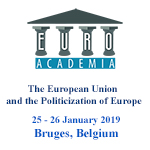Euroacademia Conferences
 Europe Inside-Out: Europe and Europeanness Exposed to Plural Observers (9th Edition) April 24 - 25, 2020
Europe Inside-Out: Europe and Europeanness Exposed to Plural Observers (9th Edition) April 24 - 25, 2020 Identities and Identifications: Politicized Uses of Collective Identities (9th Edition) June 12 - 13, 2020
Identities and Identifications: Politicized Uses of Collective Identities (9th Edition) June 12 - 13, 2020 8th Forum of Critical Studies: Asking Big Questions Again January 24 - 25, 2020
8th Forum of Critical Studies: Asking Big Questions Again January 24 - 25, 2020 Re-Inventing Eastern Europe (7th Edition) December 13 - 14, 2019
Re-Inventing Eastern Europe (7th Edition) December 13 - 14, 2019 The European Union and the Politicization of Europe (8th Edition) October 25 - 26, 2019
The European Union and the Politicization of Europe (8th Edition) October 25 - 26, 2019 Identities and Identifications: Politicized Uses of Collective Identities (8th Edition) June 28 - 29, 2019
Identities and Identifications: Politicized Uses of Collective Identities (8th Edition) June 28 - 29, 2019 The European Union and the Politicization of Europe (7th Edition) January 25 - 26, 2019
The European Union and the Politicization of Europe (7th Edition) January 25 - 26, 2019 7th Forum of Critical Studies: Asking Big Questions Again November 23 - 24, 2018
7th Forum of Critical Studies: Asking Big Questions Again November 23 - 24, 2018 Europe Inside-Out: Europe and Europeanness Exposed to Plural Observers (8th Edition) September 28 - 30, 2018
Europe Inside-Out: Europe and Europeanness Exposed to Plural Observers (8th Edition) September 28 - 30, 2018 Identities and Identifications: Politicized Uses of Collective Identities (7th Edition) June 14 - 15, 2018
Identities and Identifications: Politicized Uses of Collective Identities (7th Edition) June 14 - 15, 2018
The Rise of Ethno-nationalist Populism in Slovenia
-
-

-
Presentation speakers
- Iztok Šori, Peace Institute, Ljubljana, Slovenia
- Mojca Pajnik, Peace Institute, Ljubljana, Slovenia
Abstract:
The political shifts in the post 1989 period in Central and Eastern Europe and the military conflicts in the Balkans intensified ethnic nationalism in these societies, but simultaneously also gave rise to populism of the extreme right and consequently to hatred of minorities and a shift towards reifying national values that the communist regime allegedly suppressed. Slovenia as one of the former Yugoslav republics was no exception: the rise of the extreme right intensified ethno-nationalism coupled with authoritarian tendencies of governing “the people” by reproducing groups of the excluded. Populist right of post-socialist Slovenia found the new enemies in various groups of “others” who were imagined as endangering the future of the nation and its people, such as migrants, LGBTQ+, “the erased”, Roma etc. This paper suggests that the process of establishing independent statehood were largely based on right wing populist parties’ attempts to differentiate the Slovenian national identity from anything that is seen or considered as Balkan, which became a metaphor for backward and primitive. Exclusionary populism intensified over the last two decades, which will be shown in the paper by employing the case study analysis of the Slovenian Democratic Party (SDP). Approaching populism at the crossroads of ideology and political style, we will analyse communication strategies and discourses of SDP to unravel framing of social problems employed by the party and its leader. A particular attention will also be given to reflect the last parliamentary elections (from June 2018) that at the example of SDP election campaign showed “spill-overs” when SDP anti-migration election strategies were copied from those employed by the Hungarian prime minister Victor Orbán and his governing Fidesz.
-
Related Presentations

Measure and Limit: Thinking of Europe at the Meridian
- Sandro Gorgone

Yugoslavia on Instagram: The (Re)Construction of a Collective Identity from the Past
- Elisabetta Zurovac
- Giovanni Boccia Artieri













